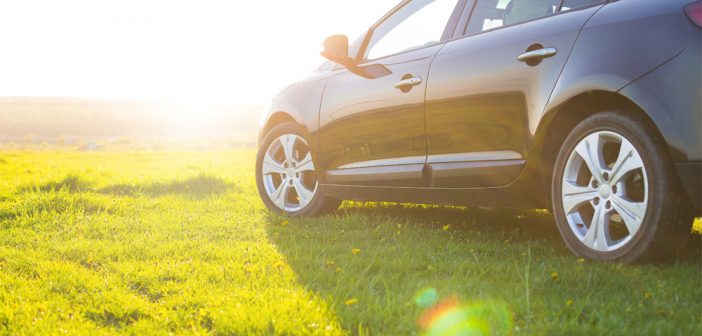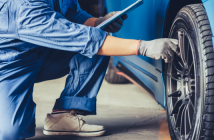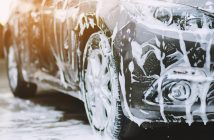The summer sun can be harsh, and most people know to protect their skin from it. There are steps that you can take to protect your car from the sun, as well.
Of course, cars get hot sitting in the summer sun, but it’s surprising just how hot they can get. Car interiors can get to 140° F very quickly on a summer day, and dashboards can get over 180° F. Leaving windows cracked open doesn’t help much, because that doesn’t provide much ventilation.
Auto exteriors can get remarkably hot, even reflective chrome trim. When you add in the damage that strong UV radiation can do to the exterior and the interior, it’s easy to see why it’s important to protect your car from the damage that a sunny summer day can cause.
Park Carefully
Park Carefully If it’s possible, walking a little bit more to leave your car parked in the shade is a worthwhole tradeoff. If there is no available shade, try to park facing away from the sun. A car parked with the rear passenger corner facing the sun will stay much cooler than it will with the windshield facing the sun.
Cover Your Windows
Window tinting can reduce the effects of bright sunlight dramatically, but it’s not inexpensive, and some states have strict laws about how much tint is allowed. If tinting isn’t a good option for you, a folding sun shield put in place on your dashboard and rear deck when you park can help a lot. Yes, they seem inconvenient, but it’s a minor chore. It will save you from the major chore of sitting on hot leather seats while you’re wearing shorts. There are also cling-on sunshades available for the side windows that will take some of the sting out of the sun. These are particularly important when and where young children are riding along, because the sun can burn them while the interior temperatures are comfortable.
Check The Fluids Frequently
Coolant, water in your battery, and other fluid levels go down faster in hot weather. When combined with the other stresses that heat causes, this becomes a bad mix for your engine. Check them frequently and keep them full. Oil lubricates your engine, and it also helps carry heat away from the cylinders. A car that’s low on oil can overheat even if there is plenty of coolant.
Check Your Tire Pressure Monthly
Under-inflated tires generate more heat on the road, and if everything is already warm, this heat can cause tire damage or a blowout. Check the tire pressure at least once every month, preferably in the morning before you drive anywhere. Use the pressure recommendations in your car, not the ones on the sidewall of the tire. The manufacturer’s tire pressure information is on a sticker on the front of the driver’s side door post.
Have Your Battery and Charging System Checked
Other than the heat, summer weather also puts extra stress on your electrical system because of the load your A/C places on it. Check to be sure that your battery and alternator are up to the stress of summer, to prevent a failure to start.
Keep the Interior Clean
In the high temperatures that your car’s interior can reach, grime can bake on solidly. Be sure to use cleaning products that are intended for automotive materials. Cleaners intended for kitchens can dry out and damage materials used in cars. If you do this frequently, it’s a small, easy job. If you have leather seats, you have probably noticed how warm they can get from the sun. This isn’t only uncomfortable on bare legs, but it’s also really hard on the leather. Use a good leather conditioner to keep it supple and prevent cracking. Look for one that offers UV protection, if you can find one. Part of this is being careful about what you store in your car. Chocolate, lipstick, crayons, aerosols, lip balm, or anything that will melt at high temperatures should not be stored in your car in the summertime.
Wash and Wax the Exterior
Wash and Wax the Exterior Grime and dust abrade your car’s finish, dulling it. A good coat of quality wax over your clean car protects the finish from that, and selecting one with UV protection will help your car’s finish survive the UV damage that strong sunlight can cause.
Make Sure That Your Air Filters Are Clean
Dust is more common during summer months, so air filters are prone to collecting more of it. A clogged air filter will reduce your mileage and cause more engine wear. Excessive dust can cause damage to the mass air flow sensor. This controls your fuel/air mix, and is an expensive repair that is easily prevented by keeping your air filter clean.








